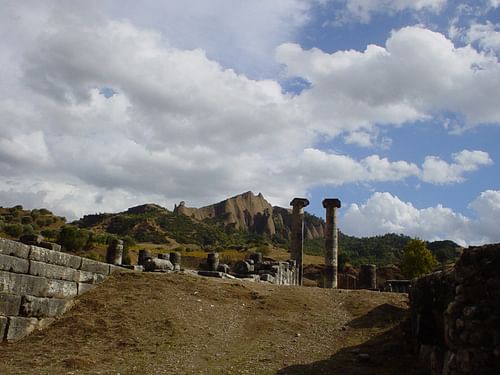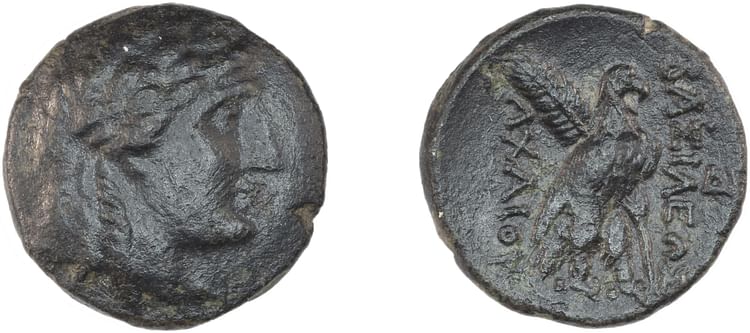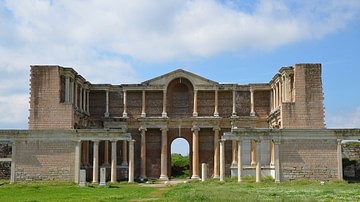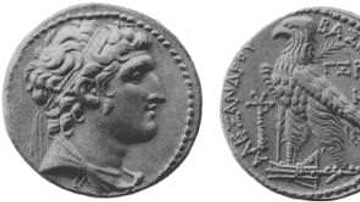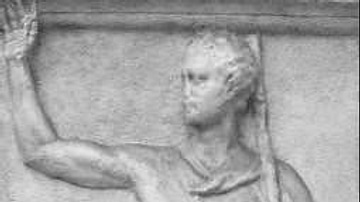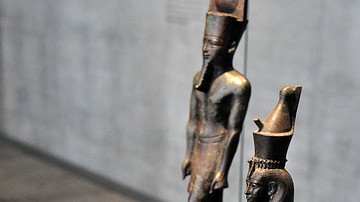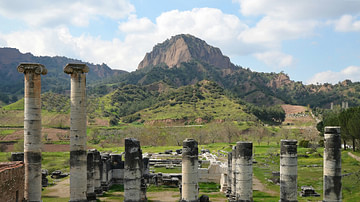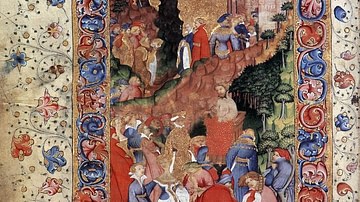Polybius' Capture of Achaeus and Fall of Sardis is the account of the end of the Siege of Sardis (215-213 BCE) by Antiochus III (aka Antiochus the Great, r. 223-187 BCE) of the Seleucid Empire after the betrayal and capture of his cousin Achaeus (d. 213 BCE) who had proclaimed himself king.
The piece has become famous for the line describing Sardis as "the strongest place in the world" or "the strongest fortress in the world," almost always quoted out of context. Modern-day writers often repeat the line as though Polybius (l. c. 200 to c. 118 BCE) is claiming the city (and specifically the citadel) was "the strongest place in the world," but he is using that phrase ironically at the point in the story (8.20.12) when Achaeus has been captured while his people believe he is still safe in the citadel. The story is also well-known as a cautionary tale on trusting others, especially on matters of great importance.
Background & Summary of the Story
The Seleucid Empire (312-63 BCE) had been weakening since Arsaces I of Parthia (r. 247-217 BCE) had broken away to establish his own kingdom, encouraging others to do the same. Seleucid monarchs fumbled in trying to pull the empire back together until Antiochus III came to power in 223 BCE and, beginning in 219 BCE, personally led his troops on campaign to put down the revolts and reunite his territories. He entrusted Asia Minor, west of the Taurus Mountains, to his cousin Achaeus who had consistently proven his loyalty in the past. When Achaeus was accused of plotting insurrection, however, he understood that Antiochus III was not likely to wait to hear his side of the story or show mercy and so he declared himself King of Sardis and lord of the western territories. In 216 BCE, Antiochus arrived in Asia Minor (Anatolia) and placed Sardis under siege in 215 BCE.
The city was located in the Hermus Valley below the Mount Tmolus range, and high on the mountain was the acropolis with its famous citadel. Even if the city on the plain were taken, the citadel was easily defended and so, as the modern-day claim goes, may well have been regarded as "the strongest place in the world" (though Polybius does not use the phrase as many modern writers cite it). Achaeus, his wife Laodice of Pontus, his family and advisors, and others had all taken refuge in the citadel and there was no way for Antiochus to reach them. There was also, however, no way for Achaeus to leave and rally troops elsewhere to lift the siege.
Sosibius (l. 3rd century BCE), chief minister of Ptolemy Philopator of Egypt (r. 221-204 BCE), had been instrumental in the defeat of Antiochus III at the Battle of Raphia (also known as the Battle of Gaza, 217 BCE) which turned back the Seleucid king's invasion of Egypt. He now sought some means of freeing Achaeus from the citadel both to help the enemy of his enemy and, hopefully, defeat Antiochus III and break his power. Sosibius hired a Cretan named Bolis, who claimed to know the region around Sardis, could navigate the dangerous path down from the citadel at night, and would be able to lead Achaeus secretly to safety.
Once Bolis was hired and sent on his mission, however, he conferred with two others, Cambylus (an officer in Antiochus III's army) and Arianus (one of his own officers), and they agreed to divide the money Sosibius had given Bolis between them, inform Antiochus III of the plot and receive a sizeable reward from him, and then deliver Achaeus to Antiochus III for an even greater sum. The plan was put into effect, Achaeus was taken, handed over to Antiochus III, and executed, and Sardis fell in 213 BCE after the surrender of the citadel.
The Text
The following passage comes from the Histories of Polybius, Book 8, translated by W. R. Paton. Some lines from Chapter 15 and the whole of Chapter 18, discussing the conspirators' plans and the assurance of payment by Antiochus III, are omitted in the interests of space.
15 1 There was a certain Cretan named Bolis who had long occupied a high position at the court of Ptolemy, being regarded as a man possessed of superior intelligence, exceptional courage, and much military experience. 2 Sosibius, who had by continued intercourse with this man secured his confidence and rendered him favourably disposed to himself and ready to oblige him, put the matter in his hands, telling him that under present circumstances there was no more acceptable service he could render the king than to contrive a plan to save Achaeus. 3 Bolis after listening to him, said he would think the matter over, and left him. 4 After taking counsel with himself he came to Sosibius two or three days afterwards and agreed to undertake the business, adding that he had spent some time in Sardis and knew its topography, and that Cambylus the commander of the Cretans in Antiochus' army was not only his fellow-citizen, but his relative and friend. 5 It happened that Cambylus and his force of Cretans had charge of one of the outposts behind the citadel where the ground did not admit of siege-works, but was guarded simply by the continuous line of these troops of Cambylus. 6 Sosibius received this suggestion with joy, and [advanced funds to meet all the expenses of the undertaking]. ...
9 Bolis, who was quite ready for the enterprise, set sail without the least delay carrying dispatches in cypher and credentials first to Nicomachus at Rhodes, whose affection for Achaeus and fidelity towards him were regarded as being like those of a father to a son, and next to Melancomas at Ephesus. 10 For these were the two men who in former times had acted as the agents of Achaeus in his negotiations with Ptolemy and all his other foreign schemes.
16 1 On reaching Rhodes and subsequently Ephesus, Bolis communicated with these men, and finding them disposed to accede to his requests next sent one of his officers named Arianus to Cambylus, 2 saying that he had been dispatched from Alexandria to raise troops and wished to meet Cambylus to consult him about some matters of urgency. He therefore thought it best to fix a date and place at which they could meet without anyone knowing of it. 3 Arianus made haste to meet Cambylus and deliver his message, upon which the latter readily complied with the request, and having fixed a day and a place known to both, at which they could meet by night, sent Arianus back. 4 Now, Bolis being a Cretan and naturally astute, had been weighing every circumstance and testing the soundness of every plan; 5 but finally met Cambylus as Arianus had arranged, and gave him the letter. With this before them they discussed the matter from a thoroughly Cretan point of view. 6 For they did not take into consideration either the rescue of the man in danger or their loyalty to those who had charged them with the task, but only their personal security and advantage. 7 Both of them, then, Cretans as they were, soon arrived at the same decision, which was to divide between them in equal shares the ten talents advanced by Sosibius 8 and then to reveal the project to Antiochus and undertake, if assisted by him, to deliver Achaeus into his hands on receiving a sum of money down and the promise of a reward in the future adequate to the importance of the enterprise. 9 Upon this Cambylus undertook to manage matters with Antiochus, while Bolis agreed to send Arianus to Achaeus in a few days with letters in cypher from Nicomachus and Melancomas bidding Cambylus see to it that he got into the citadel and out again in safety. 11 Should Achaeaus agree to make the attempt and answer Nicomachus and Melancomas, Bolis engaged to devote his energies to the matter and communicate with Cambylus. 12 With this understanding they took leave, and each continued to act as they had agreed.
17 1 First of all Cambylus, as soon as he had an opportunity, laid the matter before Antiochus. 2 The king, who was both delighted and surprised at the offer, was ready on the one hand in his extreme joy to promise anything and on the other hand was so distrustful that he demanded a detailed account of their project and the means they were to employ. 3 Hereupon, being now convinced, and almost regarding the plan as directly inspired by Providence, he continued to urge upon Cambylus to put it into execution. 4 Bolis meanwhile had likewise communicated with Nicomachus and Melancomas, who, believing that the attempt was being made in all good faith, at once drew up for Arianus letters to Achaeus written in the cypher they used to employ, 5 so that no one into whose hands a letter fell could read a word of it, and sent him off with them, begging Achaeus to place confidence in Bolis and Cambylus. 6 Arianus, gaining admission to the citadel by the aid of Cambylus, handed the letters to Achaeus, and, as he had been initiated into the plot from the outset, gave a most accurate and detailed account of everything in answer to the numerous and varied questions that were asked him concerning Sosibius and Bolis, concerning Nicomachus and Melancomas and chiefly concerning Cambylus. 7 He was able to support this cross-questioning with confidence and candour chiefly because he had no knowledge of the really important part of the agreement between Cambylus and Bolis. 8 Achaeus, convinced by the examination of Arianus and chiefly by the letters in cypher from Nicomachus and Melancomas, at once dispatched Arianus with a reply. 9 After some continuance of the correspondence Achaeus finally entrusted his fortunes to Nicomachus, there being now no other hope of safety left to him, and directed him to send Bolis with Arianus on a moonless night when he would deliver himself into their hands. 10 It should be known that the notion of Achaeus was, when once he had escaped from his present perilous position, to hasten without any escort to Syria, 11 for he had the greatest hope, that by suddenly and unexpectedly appearing to the people in Syria while Antiochus was still occupied in the siege of Sardis, he would create a great movement in his favour and meet with a good reception at Antioch and throughout Coele-Syria and Phoenicia.
19 1 Achaeus, receiving Bolis with singular cordiality, questioned him at length about all the details of the scheme, 2 and judging both from his appearance and his manner of talking that he was a man equal to the gravity of the occasion, while he was on the one hand overjoyed at the hope of delivery, he was yet in a state of the utmost excitement and anxiety owing to the magnitude of the consequences. 3 As, however, he was second to none in intelligence, and had had considerable experience of affairs, he judged it best not to repose entire confidence in Bolis. 4 He therefore informed him that it was impossible for him to come out of the citadel at the present moment, but that he would send three or four of his friends, and after they had joined Melancomas, he would himself get ready to leave. 5 Achaeus indeed was doing his best, but he did not consider that, as the saying is, he was trying to play the Cretan with a Cretan; for there was no probable precaution of this kind that Bolis had not minutely examined. 6 However, when the night came in which Achaeus had said he would send out his friends with them, he sent on Arianus and Bolis to the entrance of the citadel, ordering them to await there the arrival of those who were about to go out with them. 7 When they had done as he requested, he revealed at the last moment the project to his wife Laodice, who was so much taken by surprise that she almost lost her wits, so that he had to spend some time in beseeching her to be calm and in soothing her by dwelling on the brightness of the prospect before him. 9 After that, taking four companions with him, whom he dressed in fairly good clothes while he himself wore a plain and ordinary dress and made himself appear to be of mean condition, he set forth, ordering one of his friends to answer all Arianus' questions and to address any necessary inquiries to him stating that the others did not know Greek.
20 1 Upon their meeting Arianus, the latter placed himself in front of owing to his acquaintance with the path, while Bolis, as he had originally designed, brought up the rear, finding himself, however, in no little doubt and perplexity as to the facts. 2 For although a Cretan and ready to entertain every kind of suspicion regarding others, he could not, owing to the darkness, make out which was Achaeus, or even if he were present or not. 3 But most of the way down being very difficult and precipitous, at certain places with slippery and positively dangerous descents, whenever they came to one of these places some of them would take hold of Achaeus and others give him a hand down, 4 as they were unable to put aside for the time their habitual attitude of respect to him, and Bolis very soon understood which of them was Achaeus. 5 When they reached the spot where they had agreed to meet Cambylus, and Bolis gave the preconcerted signal by a whistle, the men from the ambush rushed out and seized the others while Bolis himself caught hold of Achaeus, clasping him along with his clothes so that his hands were inside, as he was afraid lest on perceiving that he was betrayed he might attempt his life, for he had provided himself with a sword. 7 He was very soon surrounded on all sides and found himself in the hands of his enemies, who at once led him and his friends off to Antiochus. 8 The king, who had long been waiting the issue in a fever of excitement, had dismissed his usual suite and remained awake in his tent attended only by two or three of his bodyguard. 9 When Cambylus and his men entered and set down Achaeus on the ground bound hand and foot, Antiochus was so dumbstruck with astonishment that for a long time he remained speechless and at last was deeply affected and burst into tears, 10 feeling thus, as I suppose, because he actually saw how hard to guard against and how contrary to all expectation are events due to Fortune. 11 For Achaeus was the son of Andromachus the brother of Laodice the wife of Seleucus; he had married Laodice the daughter of King Mithridates, and had been sovereign of all Asia on this side of the Taurus; 12 and now when he was supposed by his own forces and those of the enemy to be dwelling secure in the strongest fortress in the world, he was actually sitting on the ground bound hand and foot and at the mercy of his enemies, not a soul being aware of what had happened except the actual perpetrators of the deed.
21 1 But when at dawn the king's friends flocked to his tent, as was the custom, and saw the thing with their own eyes, they were in the same case as the king himself had been; for they were so astonished that they could not credit their sense. 2 At the subsequent sitting of the Council, there were many proposals as to the proper punishment to inflict on Achaeus, and it was decided to lop off in the first place the unhappy prince's extremities, and then, after cutting off his head and sewing it up in an ass's skin, to crucify his body. 4 When this had been done, and the army was informed of what had happened, there was such enthusiasm and wild excitement throughout the whole camp, that Laodice, who was alone aware of her husband's departure from the citadel, when she witnessed the commotion and disturbance in the camp, divined the truth. 5 And when soon afterwards the herald reached her, announcing the fate of Achaeus and bidding her come to an arrangement and withdraw from the citadel, there was at first no answer from those in the citadel but loud wailing and extravagant lamentation, not so much owing to the affection they bore Achaeus as because the event struck everyone as so strange and entirely unexpected. 7 After this outburst the garrison continued in great perplexity and hesitation. 8 Antiochus, having dispatched Achaeus, continued to press hard upon those in the citadel, feeling convinced that some means of taking the place would be furnished him by the garrison itself and more especially by the rank and file. 9 And this actually took place. For they quarreled among themselves and divided into two factions, the one placing itself under Aribazus and the other under Laodice; upon which as they had no confidence in each other, they both of them very soon surrendered themselves and the place.
10 Thus did Achaeus perish, after taking every reasonable precaution and defeated only by the perfidy of those whom he had trusted, leaving two useful lessons to posterity, firstly to trust no one too easily, and secondly not to be boastful in the season of prosperity, but being men to be prepared for anything.
